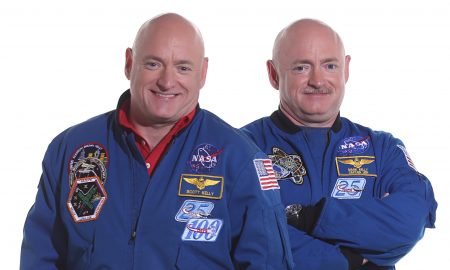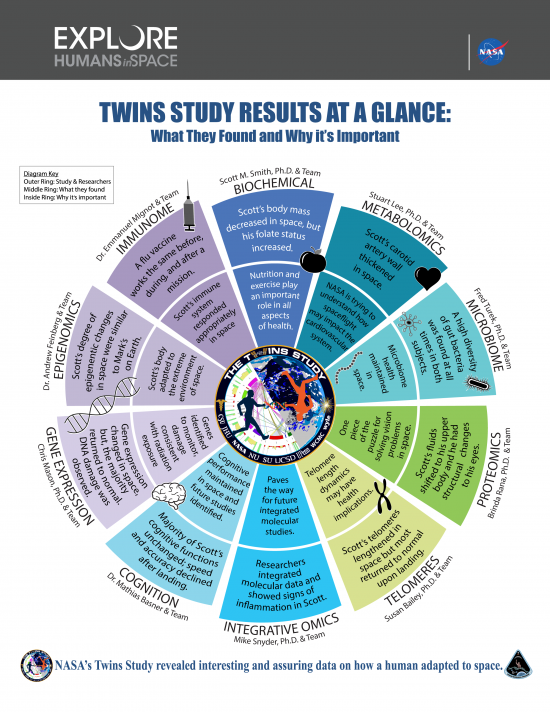
April 12, 2019 – When Scott Kelly spent 340 days on the International Space Station (ISS), his identical twin brother, also an astronaut, remained here on Earth, giving NASA a unique opportunity to compare their physiologies and the impact on DNA from a 16 billion kilometer voyage. This was the first study to compare the molecular profiles of two people with the same genetic makeup.

Why study long-duration exposure of the human body to space?
Because we are working in the dark when it comes to making plans to send humans on a mission to Mars, or a near-Earth asteroid. Scientists have been concerned about long-duration spaceflight beyond low-Earth orbit since humans first flew in space. Without the protection of Earth’s magnetic field, our bodies would be unprotected from solar and cosmic radiation. The aluminum skin of the ISS does little to stop streams of cosmic particles from passing through the bodies of those onboard. And 340 days of exposure would be equivalent to a flight to and from Mars including time on the surface where radiation would also be hazardous.
In doing the twin study NASA could come up with a comparison, not just a before and after picture. Identical twins would definitively tell us what harm lies ahead for future space voyagers.
So what have we learned?
- The human body is adaptable to space travel.
- Changes do occur in lots of the body’s systems and processes.
- Returning from space causes a reversal to most of those changes.
- Small changes do occur in gene expression, telomere dynamics, DNA disruption, carotid artery thickening, vision, and cognitive functions.
A deeper drill-down of changes follows:
Gene Expression – Scott experienced changes in his genetic makeup while on the ISS with more than 90% of these reverting back to their Earth-normal state after coming back from space. For that less than 10% the DNA changes lasted beyond six months and are believed to have been caused by radiation exposure.
Telomere Dynamics – Telomeres reside at the end of DNA strands and shorten during the lifetime of multiple cell divisions within our bodies and from exposure to stress and environmental insults. But in space Scott’s telomeres lengthened significantly and remained so after landing and being on Earth for a few days. Scientists believe that telomeres are associated with human longevity. Long telomeres translate to a long life.
Immune Response – Scott’s immune system was not affected by his 340 days in space. Scientists were concerned that prolonged spaceflight would suppress our body’s natural defenses against disease and other environmental stressors.
Circulatory System – Imaging of the carotid artery did show signs of inflammation and wall thickening both while in space and after returning from the ISS. It is not yet known if this is reversible.
Biochemistry of the Gut – Changes to gut bacteria was observed in Scott during the time in space. The cause could be attributed to the diet consumed on the ISS which includes a lot of freeze-dried and thermo-stabilized prepackaged foods. Upon return to Earth his gut bacteria reverted to the normal.
DNA disruption – Long-duration exposure, largely in the second six-months of Scott’s stay on ISS, revealed changes to his DNA. This wasn’t uniformly observed across all genetic information including Scott’s white blood cells. The changes reversed themselves shortly after landing back on Earth. The question that still needs an answer is what these changes could mean to even longer duration space travel and are there preventive countermeasures that could stop disruption of our genome.
Vision – Fluid shifts in the bodies of astronauts is a commonly observed phenomenon. Micro-gravity exposure is suspect. But what was observed in Scott that impacted vision was a change to a protein responsible for regulating the body’s hydration and dehydration. The study doesn’t report if Scott’s vision restored itself to normal upon returning to the planet’s surface.
Cognitive changes – Mental acuity, spatial orientation, and alterations in emotions were unchanged which means cognitive performance is not impacted negatively by long-duration exposure to space. But upon landing Scott did experience changes to his cognitive skills for a period of six months. Scientists suspect that this disruption happened because his body needed to readjust to Earth’s gravity.








